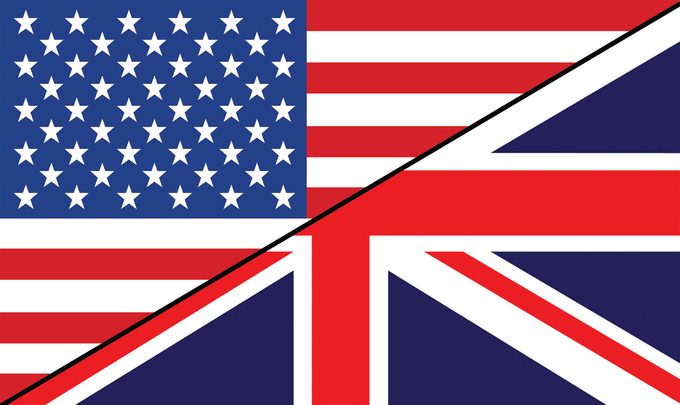Hint: The unique British spelling has to do with the American Revolution

The Real Reason Brits and Americans Spell “Color” Differently


It’s no secret that there are a few colorful British spellings out there—starting with the word color! In addition to that word gaining an extra u in the British version, British English turns organize into organise, liter into litre and canceled into cancelled. And that’s before we get into the whole thing about calling sneakers “trainers” and elevators “lifts.”
So how did our spellings become so varied? Turns out, there’s one person responsible: Noah Webster, of Merriam-Webster dictionary fame. Ahead, you’ll learn why he had it out for the u in color, and why the word is spelled differently in British and American English.
Get Reader’s Digest’s Read Up newsletter for more grammar knowledge, humor, cleaning, travel, tech and fun facts all week long.
The origins of British spelling
The established spelling of words is much more recent than you might expect. Up until the late 18th century, people didn’t concern themselves with how words were spelled. Only highly educated citizens learned to write, and so the spoken word was much more important to them than any type of “proper” spelling (just read a conversational letter from the time if you need proof).
That’s until British lexicographer Samuel Johnson published his A Dictionary of the English Language in 1755. It took a few decades to catch on, but eventually, the Brits were making serious headway toward uniform spelling—and in British English, the word color was spelled colour.
The spelling revolution
By the time Johnson’s Dictionary had gathered momentum, we Americans were stirring up trouble across the pond. After deciding we wanted to be our own country, it seemed only natural that we should have our own spellings too.
Noah Webster led the charge. “As an independent people, our reputation abroad demands that, in all things, we should be federal; be national,” he wrote in a 1789 essay urging spelling reform. “For if we do not respect ourselves, we may be assured that other nations will not respect us.”
The new American way
Spelling became a hot-button issue for Webster. In order to differentiate American English from British English, he wanted the American version to be free of the “clamor of pedantry” that he thought marred British English spellings. That meant removing the superfluous letters.
To fix the problem, Webster wrote the first American dictionary: A Compendious Dictionary of the English Language, published in 1806. If Johnson’s Dictionary defined British English, then Webster established American English—and it included a lot fewer characters.
How colour became color
In his dictionary, Webster eliminated that British clamor (or clamour, as they spell it) by taking aim at words that end in –our, including the British spelling of colour. The rule similarly nixed the u in words like valour, flavour, neighbour and behaviour.
Extraneous letters in other words also got the ax. Webster removed the –ne from the end of tonne, the e from judgement and the u from favourite. He also rearranged the letters in some common words, like the –er in theater, center and liter.
The language continues
With our new dictionary and truly patriotic spellings, the American people were able to move forward as an independent country. And while we left those colorful British spellings (pun absolutely intended!) in the past, we forged a brave new way.
However, there’s one battle we didn’t win in the fight between color and colour: Our Canadian neighbors still spell the word colour with a British u!
Why trust us
At Reader’s Digest, we’re committed to producing high-quality content by writers with expertise and experience in their field in consultation with relevant, qualified experts. We rely on reputable primary sources, including government and professional organizations and academic institutions as well as our writers’ personal experiences where appropriate. We verify all facts and data, back them with credible sourcing and revisit them over time to ensure they remain accurate and up to date. Read more about our team, our contributors and our editorial policies.
Sources:
- Phi Delta Kappan via JSTOR: “A Short History of Spelling Reform in the United States”
- The University of Glasgow: “A Dictionary of the English Language”
- BBC: “The Ages of English”
- Library of Congress: “The American Spelling Book”
- Library of Congress: “A Compendious Dictionary for the English Language, by Noah Webster, 1806”




















